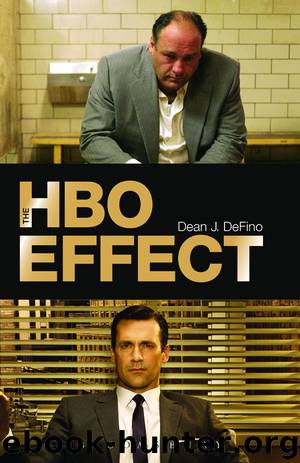The HBO Effect by Dean J. DeFino

Author:Dean J. DeFino
Language: eng
Format: epub
Publisher: Bloomsbury
Here DeLyria and Robinson offer a neat summary of a key deficiency in contemporary social problem drama. We like stories of crime, corruption, serial killings, and so on, but only when they are presented as problems that we may solve, by apprehending the criminal, reforming the system, or scapegoating an individual or institution. In this familiar formula, lack of education, ambition, and stable family structure has transformed the inner city into a breeding ground for crime and addiction. But despite its liberal—even reformist—heart, The Wire shows us something significantly darker, more venal, and beyond any platitudes of reform: the failure of social programs like low-income housing projects, “No Child Left Behind,” and the War on Drugs.
Perhaps The Wire went too far. Perhaps it was simply too dark, too authentic in the picture it paints of a decaying American city. According to David Simon, its primary influence was Humphrey Cobb’s 1935 anti-war novel, Paths of Glory, and Stanley Kubrick’s 1957 film adaptation, the basic themes of which Simon would identify in his “Foreward” to the 2010 Penguin Classic edition of Cobb’s novel as “the essential triumph of institutions over individuals” and “the fundamental inhumanity of the 20th century.”10 Elsewhere, Simon compares the worldview of The Wire to classical tragedy, where “doomed” protagonists face “postmodern institutions” in place of Olympian gods, as opposed to HBO shows like The Sopranos and Deadwood, which “focus on the angst and machinations” of Tony Soprano and Al Swearengen.11
Considering the prevalence of irony and gallows humor in The Wire, perhaps it would be better to compare it to the tragicomedy of Samuel Beckett, who used laughter less to distance the audience from life’s horrors than to acknowledge the futility of any other response. In The Wire, we laugh at sociopathic defense attorney Maurice Levy’s complaint that clients have called him away from his wife’s brisket because it so baldly expresses his indifference to his collusion in their crimes; or at cold-blooded stick-up man Omar Little announcing his presence to some soon-to-be victim by whistling “The Farmer and the Dell”/”A-Hunting We Will Go” because the murderous nursery rhyme calls up simultaneous images of Elmer Fudd and Mack the Knife12; or corrupt State Senator Clay Davis’ trademark refrain, “Shiiiiiiit,” because we recognize the purr of a cheap hustler. Theirs is a world beyond heroes and villains, where evil is so commonplace that we note it with curiosity rather than shock, and where cold-blooded gangsters like Stringer Bell wear reading glasses, sip tea, and attend business classes at the local community college. When virtue does make its occasional appearance—in the principled stances of Detective Kima Greggs and the conscientious objections of “corner kids” like Wallace and Dukie—it is quickly swallowed up by the surrounding darkness.
Nowhere is this darkness more apparent than in the series’ would-be central character, Detective Jimmy McNulty, who seems driven less by a sense of right and wrong than sheer boredom and an excess of cleverness. Some see him as too committed to the job: certainly his
Download
This site does not store any files on its server. We only index and link to content provided by other sites. Please contact the content providers to delete copyright contents if any and email us, we'll remove relevant links or contents immediately.
Cecilia; Or, Memoirs of an Heiress — Volume 1 by Fanny Burney(32559)
The Great Music City by Andrea Baker(32020)
Cecilia; Or, Memoirs of an Heiress — Volume 2 by Fanny Burney(31957)
Cecilia; Or, Memoirs of an Heiress — Volume 3 by Fanny Burney(31943)
We're Going to Need More Wine by Gabrielle Union(19049)
All the Missing Girls by Megan Miranda(16034)
Pimp by Iceberg Slim(14513)
For the Love of Europe by Rick Steves(14144)
Bombshells: Glamour Girls of a Lifetime by Sullivan Steve(14077)
Talking to Strangers by Malcolm Gladwell(13374)
Norse Mythology by Gaiman Neil(13371)
Fifty Shades Freed by E L James(13245)
Mindhunter: Inside the FBI's Elite Serial Crime Unit by John E. Douglas & Mark Olshaker(9345)
Crazy Rich Asians by Kevin Kwan(9294)
The Lost Art of Listening by Michael P. Nichols(7507)
Enlightenment Now: The Case for Reason, Science, Humanism, and Progress by Steven Pinker(7315)
The Four Agreements by Don Miguel Ruiz(6766)
Bad Blood by John Carreyrou(6623)
Weapons of Math Destruction by Cathy O'Neil(6282)
